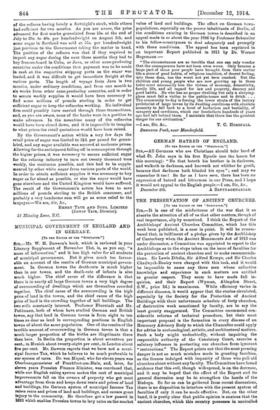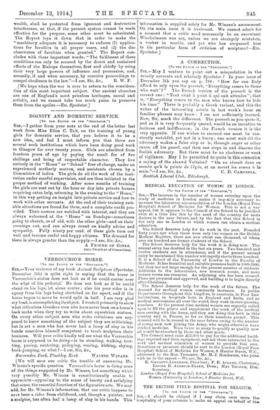THE PRESERVATION OF ANCIENT CHURCHES. (To TRR EDITOR OT TER
*•brECTATOR."] SIR,—It is one of the misfortunes of the war that it so absorbs the attention of all of us that other matters, though of real importance, slip by unnoticed. I think the Report of the Archbishops' Ancient Churches Committee, which has this week been published, is a case in point. It will be remem- bered that, in fulfilment of a pledge given by the Archbishop of Canterbury when the Ancient Monuments Act of 1913 was under discussion, a Committee was appointed to report to the Archbishops as to the steps taken on the issue of faculties for the protection of ancient churches and to make recoinmenda- lions. Sir Lewis Dibdin, Sir Alfred Kempe, and Sir Charles Chadwyck-Healey were charged with this task, and it would be impossible to name any three men whose collective knowledge and experience in such matters are entitled to greater respect. They seem to have made full in- quiries, and their Report (Wyman, Abingdon Street, S.W., price 2d.) is unanimous. While efficiency varies in different dioceses, it would appear that the stories circulated, especially by the Society for the Protection of Ancient Buildings with their unfortunate schedule of forty churches, of destructive work sanctioned by faculty, are to say the least greatly exaggerated. The Committee recommend con- siderable reforms of technical procedure, but their most important proposal is the formation in every diocese of an Honorary Advisory Body to which the Chancellor could apply for advice in archaeological, artistic, and architectural matters. Such a body might undoubtedly, without impairing the responsible authority of the Consistory Court, exercise a salutary influence in protecting our churches from ignorant " restorations." The Report points out that the most pressing danger is not so much mistakes made in granting faculties, as the licence indulged with impunity of those who pull old churches about without any faculty. The Committee have found evidence that this evil, though widespread, is on the decrease, and it may be hoped that the effect of the Report and its general discussion may be to strengthen the hands of the Bishops. So far as can be gathered from recent discussions,
there is no disposition to interfere with the present system of faculties if only it can be made effective. But, on the other
band, it is pretty clear that public opinion is anxious that the ancient churches, which this country possesses in unrivalled wealth, shall be protected from ignorant and destructive keterferenee, so that, if the present system cannot be made effective for the purpose, some other must be substituted. The Report lays it down that in order to make the "machinery adequate it is necessary to enforce (1) applica- tions for faculties in all proper cases, and (2) the due observance of faculties when granted." The Report con- Chides with these important words: "The fulfilment of these conditions can only be secured by the direct and sustained efforts of the Bishops themselves, first and chiefly by using their very large powers of influence and persuasion, and, secondly, if and when necessary, by coercive proceedings to
compel obedience to the law."—I am, Sir, &c., R. W. F.
[We hope when the war is over to return to the considera- tion of this most important subject. Our ancient churches are one of England's most priceless heritages, moral and artistic, and we cannot take too much pains to preserve them from the spoiler.—ED. Spectator.]















































 Previous page
Previous page